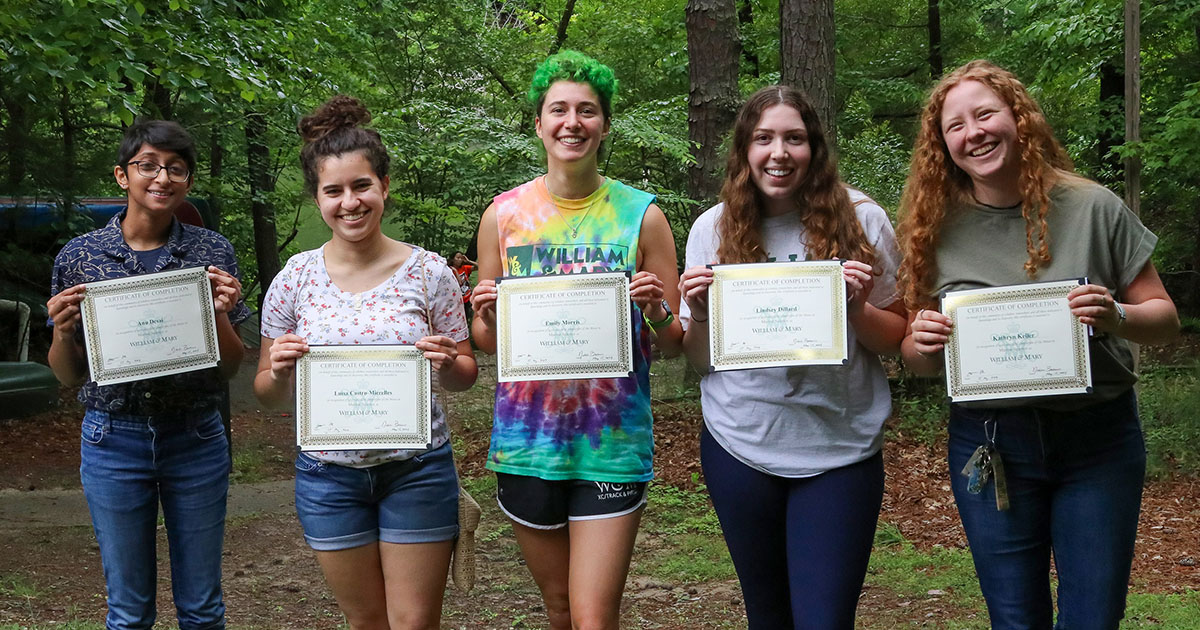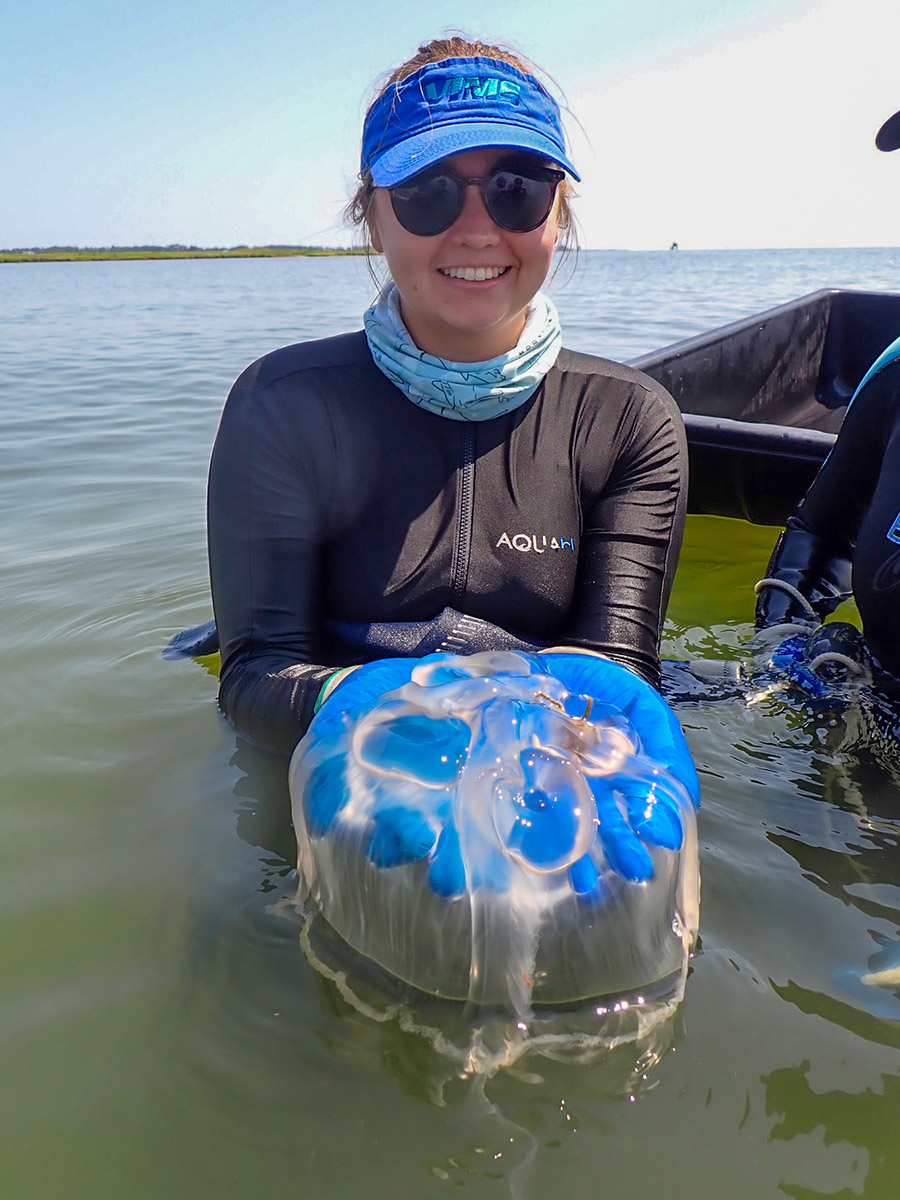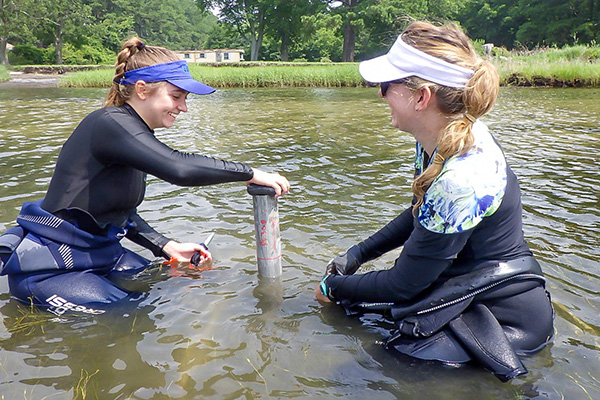Undergraduates also make an impact at VIMS, just ask Caitlin Sughrue
 William & Mary’s Virginia Institute of Marine Science didn’t just commemorate School of Marine Science (SMS) graduates last month, they also honored nine W&M undergraduates who earned their Minor in Marine Science. On Wednesday, May 15, a celebratory cookout was held at the Keck Environmental Field Laboratory, at which program co-directors Chris Hein and Nick Balascio handed out certificates and personal notes signed by faculty.
William & Mary’s Virginia Institute of Marine Science didn’t just commemorate School of Marine Science (SMS) graduates last month, they also honored nine W&M undergraduates who earned their Minor in Marine Science. On Wednesday, May 15, a celebratory cookout was held at the Keck Environmental Field Laboratory, at which program co-directors Chris Hein and Nick Balascio handed out certificates and personal notes signed by faculty.
Interest in marine science courses at W&M has increased substantially in recent years, and the Board of Visitors recently approved plans to create a bachelor’s degree program. If approved by the State Council of Higher Education for Virginia, it is predicted to launch in August 2025.
 Caitlin Sughrue, a biology major from Arlington, Virginia, chose W&M because of the SMS at VIMS. She says that she would have majored in marine science had it been an option, but she doesn’t feel like her exposure was limited in her time at W&M.
Caitlin Sughrue, a biology major from Arlington, Virginia, chose W&M because of the SMS at VIMS. She says that she would have majored in marine science had it been an option, but she doesn’t feel like her exposure was limited in her time at W&M.
“I appreciate that I was able to get a broad background in biology while still engaging in so much research at VIMS,” said Sughrue.
Sughrue grew up fascinated by the environment and understanding the various processes within it. Coupled with fond family experiences at the ocean, she decided she wanted to be a marine biologist at an early age.
“I’ve always been interested in understanding how things work, and biology and ecology seem so much more tangible to me than, say, chemistry or physics,” said Sughrue. Her innate fascination with ecosystems served her and VIMS well during her undergraduate experience.
“Caitlin has been a wonderful part of my lab group, at this point functioning at the level of a master’s student,” said VIMS Associate Professor and Director of the Submerged Aquatic Vegetation (SAV) Monitoring and Restoration Program Chris Patrick. “Her work with sea grasses fits into larger VIMS efforts that I think will be an important contribution to the literature.”
Working in Patrick’s lab, Sughrue contributed significantly to the SAV Program while conducting research of her own and assisting with projects led by her mentor, SMS Ph.D. candidate Alyson Hall. Sughrue’s honors thesis focused on carbon storage in seagrass meadows, comparing the two dominant grasses in the Chesapeake Bay: Zostera marina, or eel grass, and Ruppia maritima, or widgeongrass.
“The main finding was that Ruppia meadows store more carbon than Zostera meadows,” said Sughrue. “Zostera is the historically dominant species, but it’s less heat tolerant and Ruppia has been taking over. This might seem like a good thing since it stores more carbon, but they occupy different niches in the ecosystem and it’s important that they both exist.”
 Hall provided mentorship and guidance as Sughrue gained experience conducting research in the field and writing her honors thesis, which was supported by two grants from W&M’s Charles Center. The two became close over the last several years, with Sughrue assisting in carrying out experiments and fieldwork related to Hall’s own seagrass research.
Hall provided mentorship and guidance as Sughrue gained experience conducting research in the field and writing her honors thesis, which was supported by two grants from W&M’s Charles Center. The two became close over the last several years, with Sughrue assisting in carrying out experiments and fieldwork related to Hall’s own seagrass research.
“Before coming to VIMS, I had no experience with field work,” said Sughrue. “Aly does a great job of breaking things down and has always been welcoming and approachable. She and Chris have been great role models and helped me tremendously in carrying out my thesis.”
Next, Sughrue will travel to Cape Cod, Massachusetts, to participate in the National Parks Service’s Scientists in Parks program. Scientists in Parks is a nine-month, research-based program that places aspiring professionals across the National Park System to work on natural resource management needs. Sughrue hopes to continue working in coastal ecology and is considering graduate school following the experience.
Sughrue is thankful for the people she’s met and the relationships she’s formed during her undergraduate experience. She encourages other students to make connections and take advantage of opportunities as they arise.
“Don’t be afraid to email a professor or reach out to a current student. There’s such a great community at VIMS who wants to help others succeed, especially undergraduates,” said Sughrue.
